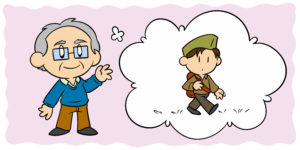Theme is one of the first aspects of literary critique that we learn about in school and one of the first things we forget when it comes to improving our work. It’s an odd dichotomy so ingrained that many authors will proudly declare that they have no idea what themes are at play in their work. With all that being the case, is there really a case for deliberately involving theme in the editing process? Let’s find out.
What is theme?
A theme is the binding idea of a story, a core subject that pervades a work of art and gives it meaning as a whole. This may sound similar to a motif, which we discussed recently in Why A Motif Could Be Just What Your Story Needs, but motifs are the sprinkles on top of a work, there to accentuate the solid core of theme that binds it all together.
In terms of writing and editing, utilizing theme is the process of recognizing and actualizing the ideas running through your story. Those ideas might be about revenge, family, depression, joy, etc., but a theme is what connects them all together, taking the disparate stories of multiple characters and forging them into a whole.
In Terry Pratchett’s The Fifth Elephant, Pratchett tackles the theme of authority; where it comes from, how it can be wielded responsibly, and where it ends. Different characters struggle with different types of authority: the main antagonist is a lawless aristocrat who hunts people for sport, while protagonists include a police captain asked to work as a diplomat, a politician exercising a light touch to change the world, a sergeant asked to become a captain (and becoming drunk on the power), an heir to the throne who prefers a normal life, and a wolf whose authority over and responsibility for his pack is at once less complex and more urgent than the issues faced by the human characters.
Theme connects disparate aspects of a work into a whole.Click To TweetEach of these characters engages with the theme of authority, and by acknowledging this fact, Pratchett is able to use each to comment on the others. This opens the door to much subtler writing as, once the characters are consciously connected, the fate or outlook of one influences how the reader sees every other situation. Where one character is given authority they didn’t want and tries to cope with the attendant responsibility, their performance makes every other character in that position look better or worse. In this way, even small moments can be used to inform the entire story, giving the reader a sense of cohesion and scope.
The downsides of theme
The problem with theme is that it’s a pattern, and readers are always looking for a pattern. Fail to deliberately consider theme and you’re not excising it from your work, you’re just relinquishing your control over it. This is an issue with many works that end up sending messages their writers didn’t intend – if you throw a bunch of ideas together without consciously managing their interplay, the reader is going to start looking for their own connections.
As an example, consider a male protagonist who is written with a wife, a sister, and a female boss. An author could start stripping away everything that character relies on, but if the people closest to them all happen to be women, and all those people need to let them down/abandon them/betray them, it’s easy to establish an accidental theme of ‘betrayal by women’. It might not be what the author intended – they might have had a completely different reason that all those important characters were women – but if they’re not thinking about how the events of their story combine into themes, it’s easy to send this kind of message unintentionally.
If you don’t cultivate theme, it can grow wild, and in directions you never intended.Click To TweetIt’s relatively rare that an author comprehensively lists their themes, but there are a huge number of books, plays, and films out there that seem to convey an unintentional theme. Is the children’s film The Incredibles deliberately infused with the theme of Randian objectivism? Its director, Brad Bird, says not, and it’s easy to see how the observable parallels could be accidental. A story that begins with the premise of superheroes forced to hide their power very easily becomes a story about individual exceptionalism, after all. Either way, this is the theme that predominates the vast majority of critical discussion around the film, and if Bird didn’t intend to grapple with it, he certainly left the space for it to develop on its own.
In this way, theme can be a huge benefit to your work, but it also threatens to curdle when ignored. It may be surprising, then, that so many authors don’t bother to engage with theme.
Why does theme get ignored?
As I’ve already mentioned, theme tends to develop whether it’s cultivated or not, and different readers are prepared to connect different ideas. Because of this, it’s not uncommon for readers to see themes in a work that the author didn’t intend, or for authors to scoff at readings of their work.
Brad Bird has rejected objectivist readings of The Incredibles, and in her Masterclass lectures, author Judy Blume explicitly advises author to ignore theme.
Themes: a word that makes me ill… I don’t know what my themes are, because I don’t think in terms of themes… Usually someone tells me. Like, I’ll read a review, or I’ll read a piece about my book, and it will say, ‘The theme of this book is…’ And I’ll say, ‘Oh, that’s what I was writing.’ … I stay away from thinking in terms of themes, and I think you can too.
– Judy Blume, ‘Writing for Younger Readers – Part 1’, MasterClass
This attitude is common, and it seems to boil down to the idea that the reader is inventing aspects of a work that the author didn’t intend; that their view of theme is invented and thus something that can be ignored. As we’ve covered before, however, the author loses their authority over a work once it’s released. Any themes that exist after that point exist regardless of their opinion and, as with The Incredibles, could dominate later discussion.
It’s easy to ignore theme, but your readers won’t.Click To TweetAnother reason theme tends to be ignored is that it’s possible for authors to get lucky. If you’ve planned your story out and considered every angle, your theme can just fall into place, especially in a narrow story or a world with set rules. While George R.R. Martin’s A Song of Ice and Fire series has clear themes, it also exists in a world with certain thematic rules; the focus on power and betrayal set up a unique form of cause and effect that plays into a sense of theme – it’s unlikely any character in Martin’s series is going to suddenly feel like they’re detached from the ‘great game’ and off doing their own thing.
Theme isn’t something artificial you add to a story, but the story’s expression of its ideas which you can then cultivate into something even more effective. If your story lends itself to theme through planning or consistency, a beneficial theme may develop on its own, and this is likely the case for Blume. Still, there’s no need to leave things to chance when you can deliberately manage theme for a better story.
Making links
As I said above, theme is generally an expression of what your story is really about. Because of this, it’s rare that you’ll have to force a theme on a story. Instead, it’s usually best to divine the theme of a story once you have some idea of its events (unless you’re building out from a theme, in which case you already know it).
Your theme is the simplest expression of where the ideas in your story are coming from and, ultimately, where they’re going. A good way to discover theme is therefore to look for links between key events and characters. What do they have in common, even on an aesthetic level?
Many authors have had the experience of writing a story and then, on revisiting it, discovering that many moments, characters, and ideas connect in ways they hadn’t planned or expected. It’s easy to call this luck, but it’s usually theme expressing itself. If you notice these helpful coincidences, follow them to their source.
If you’re not so lucky, begin by examining your protagonist’s journey. What do they want, how do they pursue it, what obstacles do they face? Ask this of all the major characters and then look for links, especially focusing on what makes these aspects of the story resonant.
To find theme, look for connections between characters and events. That’s where it’s already expressing itself.Click To TweetAll the main protagonists in Noah Hawley’s Before the Fall are dealing with tragedies in which they were only involved by coincidence. A woman must raise a child she never expected to have to care for, that child loses their parents without really understanding why, and an artist becomes a subject of intense media scrutiny just because he accepted a ride. This theme blossoms out to affect other characters and in to define them; the story’s conclusion reveals that more characters than expected were simply caught up in events they had no say in, and the book is interspersed with descriptions of the artist’s work which he later can’t explain to the authorities.
Obviously, this is Hawley’s finished work, but it’s easy to see how he could have studied events to find the recurring idea of tragedy as something that happens without adequate explanation and then found ways to apply that idea where it didn’t already exist. Once you uncover an idea like ‘trauma is rooted in lack of agency’, you can start finding new ways to express it and looking at how one expression or examination of this idea can inform other elements of story.
As you engage in this process, don’t close yourself off to unexpected themes. Often, we create from a place deeper than our consciousness, and it may emerge that you’re communicating something effectively even though you didn’t deliberately involve it in your story. Build on that, allow it its place, and turn a natural element of your story into something that improves it.
Finally, as your theme expresses itself, keep an eye out for moments that now seem out of place. It’s easy to write from an innate understanding of theme but then deviate from it because of a secondary concern. Maybe your story about the chaotic nature of life has a happy ending because it felt nicer, or maybe your story about temptation has a character resist just because you wanted to keep them likeable. Such decisions can benefit stories, but they should be made consciously, since they tend to work against the connections created by a strong theme.
Considering theme
Most art utilizes theme, but only some art utilizes it purposefully. Deliberate use of theme can produce more effective stories and help you craft the work you intend, leaving a much smaller gap between what you mean to say and what the reader understands. Thankfully, theme does express itself naturally, and it’s rare that you can’t discover the themes of your work through concerted study.
What themes do you use in your writing and how do you develop them? Let me know in the comments, and check out How To Manage The Politics Of Your Writing and Why A Motif Could Be Just What Your Story Needs for more advice on this topic.





